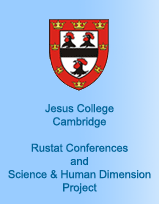

Rustat Report on Blockchain published
The report from the September 2016 Rustat Conference on Blockchain - Beyond Bitcoin is now published on the Rustat website.
Technology and AI Focus for Rustat Conferences in 2016
Machine Learning, Artificial Intelligence, the Blockchain and the Future of Work - these vital issues of today to feature in Rustat Conferences in 2016.
Rustat Conference Report on the UK North South Divide published
A diverse range of perspectives, opinions and policy suggestions appear in this new report from the UK North South Divide Rustat Conference - now available.
Big Data Analytics - Conference Report Published
The Rustat Conference on Big Data was held in collaboration with Cambridge Big Data Strategic Initiative on 30 September 2015 - report is now published.
Inequality - Rustat Conference Report
The proceedings of the March 2015 Inequality conference have been published on the Rustat website.
Transport & Energy Rustat Conference Report - November 2014
KPMG, Laing O'Rourke, McLaren, BP, Shell, HS2 and others tackled the most pressing UK transport and related energy questions.
Health Innovation: A Cambridge Success Story
The Rustat Conference on the development of the drug Campath-1H, entitled "Health Innovation: A Cambridge Success Story", took place at Jesus College on 29 January 2013. A report will be published shortly on the Rusat Conferences website.
Managing Organisational Change in the Economic Crisis
The Rustat Conference on Managing Organisational Change was held at Jesus College on 4 December 2012. The conference report is now available to download here.
The Future of Research-Intensive Universities
The sixth Rustat Conference discussed the future of research-intensive universities and was jointly hosted by the Vice-Chancellor of the University of Cambridge, Professor Sir Leszek Borysiewicz, and Professor Ian White, Master of Jesus College
Rustat Conference on UK Manufacturing
The fifth Rustat Conference was held at Jesus College, Cambridge, on 24 November 2011. Proceedings focused upon the challenges and opportunities facing the UK manufacturing sector. Chaired by Professor Ian White FREng, the conference featured contributions from leading figures from industry, government and academia.
Ethics of Human Embryo Research
Science and Human Dimension 2006
When the majority of EU ministers voted, after a bitter five-year wrangle, to grant funding for human embryonic stem cell research in July 2006, there were two remarkable consequences. First, it was widely reported by proponents of funding, for example Britain’s Science Minister Lord Sainsbury, that all arguments on the issue were now finally settled. “It is morally unacceptable to withhold advances from patients,” he commented in Brussels, “because it offers potentially tremendous advantages to European citizens.” At the same time the Catholic bishops of Europe, who, one would have thought, believed the arguments to be conclusively settled against funding, announced that the debate was not merely no over, but that it had hardly begun.
The aim of this conference was to explore the meaning of the term soul within the Judaic-Christian tradition to test strength of the Cartesian idea which is often taken for granted in the ethical debate: as in a human being is “ensouled” at the moment of conception.
Speakers included Nicholas Lash, former Norris Hulse Professor of Theology, University of Cambridge; Eamon Duffy, Professor of the History of Christianity at the University of Cambridge; John Rist on Augustine; Nicholas King on the New Testament; Ernan McMullin on the History of Science; David Albert Jones on human embryology ethics; Sir Anthony Kenny; Rahner scholar Karen Kilby; philosophical theologian, Janet Soskice; and ethicist Michael Banner. Scientists included Phil Jones of the Hutchison-MRC Centre, and John Gurdon.
The conclusions drawn by the scholars of religion were that the Christian and Judaic construals of the soul were not dualistic, and the ethics of development should, as far as possible, be seen as a process.
The papers and discussion of the conference are published by the Science and Human Dimension Project as Soul Searching.
The aim of this conference was to explore the meaning of the term soul within the Judaic-Christian tradition to test strength of the Cartesian idea which is often taken for granted in the ethical debate: as in a human being is “ensouled” at the moment of conception.
Speakers included Nicholas Lash, former Norris Hulse Professor of Theology, University of Cambridge; Eamon Duffy, Professor of the History of Christianity at the University of Cambridge; John Rist on Augustine; Nicholas King on the New Testament; Ernan McMullin on the History of Science; David Albert Jones on human embryology ethics; Sir Anthony Kenny; Rahner scholar Karen Kilby; philosophical theologian, Janet Soskice; and ethicist Michael Banner. Scientists included Phil Jones of the Hutchison-MRC Centre, and John Gurdon.
The conclusions drawn by the scholars of religion were that the Christian and Judaic construals of the soul were not dualistic, and the ethics of development should, as far as possible, be seen as a process.
The papers and discussion of the conference are published by the Science and Human Dimension Project as Soul Searching.
